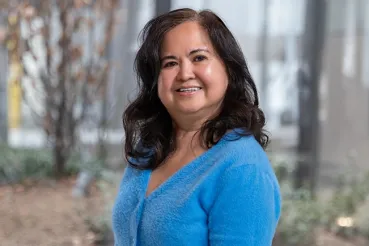Loneliness — the discrepancy between desired relationships and actual social connections — is linked to poor health and has increased in people with Parkinson’s disease, particularly since the COVID-19 pandemic. In the general population, it is related to increased mortality risk, cognitive decline, less physical activity, reduced motor functioning and increased depression. Previous research has shown that loneliness leads to a 49% increase in dementia risk over an average of six years.
Loneliness poses such grave mental and physical health risks that U.S. Surgeon General Vivek Murthy released an advisory about the epidemic of loneliness and isolation in early 2023, bringing national and international attention to the issue.
Despite its known comorbidities, loneliness is understudied in Parkinson’s disease. To learn more about its presentation in this population, David A. González, PhD, ABPP, neuropsychologist in the Department of Neurological Sciences, launched a study to examine the relationship between motor and nonmotor symptom severity and loneliness. This study will also cross-validate isolation and loneliness scales so professionals can have a range of validated tools to serve people with Parkinson’s disease.
Dr. González and his team enrolled more than 180 participants in their study and began collecting data in February. Recruitment will end this fall, and results will be disseminated soon after. The team aims to create resources for other researchers and clinicians to measure social connection and better understand the complex web of loneliness and Parkinson’s varied symptoms.
“Preliminary results reveal loneliness seems to be related to the daily functioning of people with Parkinson’s disease and how they feel it’s limiting their daily activities,” Dr. González said. “There seems to be something about the disease that’s limiting not just the number of people they see but the quality of those relationships. We need to explore that further.”
Study participants complete a survey packet that includes a loneliness scale and depression screening. Participants are asked to provide information about their social network size, perceived social support, life space circumference and quality of life. Survey responses are then linked to information about participants’ disease progression and symptoms.
Dr. González and his team also collaborate with Robert S. Wilson, PhD, professor of neurological sciences at the RUSH Alzheimer’s Disease Center, who was one of the first neuropsychologists to examine the connection between loneliness and dementia. The center treats a subset of patients with Parkinson’s, and Dr. González hopes to examine their experiences with loneliness over time.
Through his day-to-day clinical work, Dr. González evaluates patients’ cognition and mental health to help them fine-tune their treatment plans. He has always been aware of the relationship between socialization and cognitive health, which has been studied in Alzheimer’s disease and geriatric medicine broadly, but he recognized it had not been studied specifically in Parkinson’s disease.
“I noticed it was coming up more in this patient population,” Dr. González said. “Ultimately, we do want to attack the disease, but I like being able to zoom out and bring attention to the human living with the disease.”
A potential treatment for loneliness is social prescribing, or connecting patients with peers, social organizations or even volunteer opportunities. The stigma of the disease may prevent people from attending functions they were involved in before their diagnosis, so finding alternatives that make them feel comfortable, engaged and connected is key.
“Sometimes Parkinson’s robs people of their sense of worth and contribution,” said Dr. González, whose next research steps include engaging more people with advanced Parkinson’s disease and possibly integrating wearable devices to study participants’ community mobility. “Finding other ways to allow people with Parkinson’s to share some of their wisdom, experience and knowledge can reduce loneliness by helping reemphasize the value and worth they have.”




